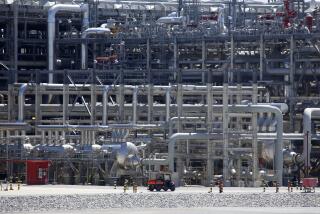Watch Out for Bumps Ahead on the Energy Road
- Share via
Each new season this year has brought a new energy problem--high oil and gasoline prices in the spring and electricity outages and rising electricity prices this summer and fall. And looming this winter are record-high prices for natural gas and shortages of gas and heating oil. Our overall economy will soon begin to suffer.
The scarcity of oil, natural gas and electricity in the United States resulted from trends forecasted by energy experts and government energy officials for the last two years. But we have yet to take action to avoid it. Because of low prices, energy policy has been the ignored stepchild of federal priorities.
This contrasts with the attitude during the 1970s, when rising oil and gas prices generated frequent headlines, dominated the G-7 summits of the world’s largest industrial democracies, influenced the Federal Reserve’s monetary policy and resulted in the creation of a new cabinet-level department.
Some policy responses, notably oil price controls, did not help. Other government actions did help by diversifying energy supply and reducing energy consumption. Those included deregulation of natural gas pricing, automobile fuel efficiency standards, research and development in new energy-efficient technologies and diversification of the sources of supply of electricity.
By the 1980s, the free market had responded well to higher oil and gas prices. Americans began to forget that stable energy supplies and prices and energy efficiency helped foster economic growth. We marveled at the productivity gains from a wired economy without worrying about the electrical current that was required to run through the computer wires. We saw a lot of people get rich and move around the country, but we forgot that gasoline and jet fuel were what allowed that physical movement to take place.
Energy producers responded to the pressures from both the financial markets and some state regulators to improve cash flows by cutting investment inventories and reserves. During the last decade, capital markets generally ignored smaller independent oil and gas companies, which have discovered most of our nations’ natural gas. As a result, our ability to produce additional supplies slowly declined and eventually ended: for non-OPEC oil, about two years ago; for natural gas for North America, last year; and for electricity, over the last two years.
Meanwhile, a decade of economic growth and cheap energy spurred consumption. The craze for SUVs and computer networks with massive servers drove energy consumption up even faster.
So now we are mired in an energy mess. Saudi Arabia controls almost all of the world’s ability to produce more oil and uses that power for its own purposes. Because of inadequate reserves, even a normal winter this year could bring high prices for and physical shortages of natural gas, with no large new supply on the horizon. Legitimate environmental issues preclude significant new electricity generation from coal, nuclear and hydroelectric plants, sources that account for 80% of current supply.
The road to this energy mess was not without warning. Early in the Clinton administration, the Energy Department substantially increased investment in new technology for energy efficiency, automobiles that use less fuel and wind and solar energy. But Congress blocked further increases after the change in congressional leadership in 1995. At the National Electrical Reliability Council, made up of all elements of the electricity business, we foresaw electricity shortages and asked Congress last year for legislation to establish a regulatory authority to ensure electrical reliability and ease transfers of power between regions. The Senate passed the bill, but two powerful House chairmen are preventing it from reaching the House floor.
Earlier this year recommendations by the Department of Energy to sell or swap oil from our giant U.S.-owned “Strategic Petroleum Reserve” to stabilize oil prices was blocked by the Treasury Department.
For years people have told me that the public and our political leaders neglect energy policy until a time of crisis. Now that time has come.
More to Read
Inside the business of entertainment
The Wide Shot brings you news, analysis and insights on everything from streaming wars to production — and what it all means for the future.
You may occasionally receive promotional content from the Los Angeles Times.










